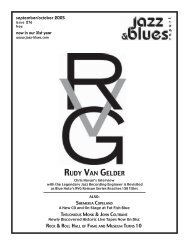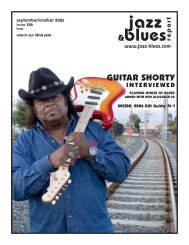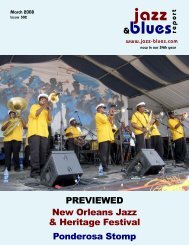#November 288-WEB2 - the Jazz & Blues Report
#November 288-WEB2 - the Jazz & Blues Report
#November 288-WEB2 - the Jazz & Blues Report
Create successful ePaper yourself
Turn your PDF publications into a flip-book with our unique Google optimized e-Paper software.
his woman and whiskey take advantage of him, laying down<br />
firmly played but spare bass while pounding out some strong<br />
right hand lines. The longest track, Days of Old, recalls his<br />
early days where he experienced <strong>the</strong> harsh conditions of a<br />
sou<strong>the</strong>rn black laborer in <strong>the</strong> dark segregation days. Slim<br />
remained a foundation of <strong>the</strong> Chicago blues scene until he<br />
died in 1995 at <strong>the</strong> age of 88, and <strong>the</strong>se recordings are a<br />
welcome reminder of his well-documented legacy.<br />
Robert Pete Williams was discovered by folklorist Harry<br />
Oster while recording prisoners at Louisiana’s infamous<br />
Angola State Penitentiary. These recordings, that originally<br />
were issued on <strong>the</strong> Folk-Lyric label (later acquired by Arhoolie<br />
on whom <strong>the</strong>y have been reissued), certainly made some<br />
aware of Williams’ stark, somber style on performances.<br />
These performances drew on Williams’ harsh life experiences<br />
and were played in a manner reflecting Blind Lemon<br />
Jefferson’s influence as channeled into <strong>the</strong> one-chord droning<br />
approach similar to that found in <strong>the</strong> early recordings of<br />
John lee Hooker and <strong>the</strong> recordings of Junior Kimbrough.<br />
His recordings led to his eventual freedom, although not until<br />
a probationary period where he was almost an indentured<br />
servant farmer. Subsequently Williams recorded for Prestige-<br />
<strong>Blues</strong>ville and this album, originally part of The Legacy of<br />
<strong>the</strong> <strong>Blues</strong> series. The ten performances here are representative<br />
of Williams’ unique art with his deeply personal lyrics,<br />
created out of <strong>the</strong> hard life he and o<strong>the</strong>rs shared but distilled<br />
through his own experiences as in his re-recording of Angola<br />
Penitentiary <strong>Blues</strong> where he recalls “Locked me down, <strong>the</strong>y<br />
tried me for my life; April <strong>the</strong> 6th, 1956, <strong>the</strong>y sent me to<br />
Angola; Not to lie, not to lie, <strong>the</strong>y tried me for my life; Cried,<br />
let’s keep <strong>the</strong> poor boy.””Come Here, Sit on My Knee features<br />
his bottleneck style that he learned from his friend, Mississippi<br />
Fred McDowell, and <strong>the</strong> performance sounds derived<br />
from Shake ‘Em On Down and o<strong>the</strong>r McDowell numbers,<br />
while Late Night Boogie, has him in his understated vocal<br />
singing about late at night blowing his horn with his unique<br />
guitar accompaniment. Williams music requires <strong>the</strong> listener’s<br />
attention, although this disc sounds like it is among his most<br />
accessible recordings. Give Robert Pete Williams music some<br />
time and its virtues will hopefully become evident to you.<br />
Ron Weinstock<br />
and Thelonious Monk’s “I Mean You” and “Off Minor.” Hampton<br />
also arranged Hoagy Carmichael’s “Stardust” and Luiz<br />
Bonfa’s Brazilian jazz number, “Morning of <strong>the</strong> Carnival.”<br />
Bold, brassy and daring, <strong>the</strong> 18-member band was<br />
formed in 1998 and has played at global festivals and concerts.<br />
Following up <strong>the</strong>ir 2004 MCG disc, Things To Come,<br />
this project is a satisfying spree that continues <strong>the</strong> Gillespie<br />
legacy. Nancy Ann Lee<br />
VARIOUS ARTISTS<br />
Time Brings About a Change...<br />
A Floyd Dixon Celebration<br />
HIGH JOHN RECORDS<br />
Recorded live at <strong>the</strong> Rhythm Room in Phoenix just 55<br />
days before his death at <strong>the</strong> age of 77, this disc serves as a<br />
fitting send off to a giant of R & B piano.<br />
Dixon, who penned such hits at “Call Operator 210” and<br />
<strong>the</strong> oft-covered “Hey Bartender” labored in relative commercial<br />
obscurity for a good share of his career but was widely<br />
admired by o<strong>the</strong>r pianists and bluesmen. That admiration is<br />
present here in <strong>the</strong> form of guest appearances by fellow pianists<br />
Henry Gray and Pinetop Perkins who warm up <strong>the</strong> stage<br />
with <strong>the</strong>ir takes on blues classics such as “Sweet Home Chicago,”<br />
“Dust My Broom,” “Down in Mississippi” and “Come<br />
Back Baby.” Also showing <strong>the</strong> love is <strong>the</strong> top notch back up<br />
band featuring Kid Ramos on Guitar, Kim Wilson on harmonica<br />
and a swinging horn section.<br />
The band put in a full day’s work before Dixon finally<br />
joined <strong>the</strong> fun more than half way through <strong>the</strong> disc on <strong>the</strong><br />
jumping “Hole in <strong>the</strong> Wall.” With an elastic vocal style that<br />
recalls Wyonnie Harris one moment and Charles Brown <strong>the</strong><br />
next, Dixon adeptly works his way through nine cuts that<br />
showcase his versatility on <strong>the</strong> piano including late night<br />
cocktail jazz, “Time Brings about a Change,” low down blues,<br />
“Cold, Cold Feeling,” jump blues, “Caledonia,” and a drastically<br />
reworked “Glory of Love.”<br />
While it was Dixon’s day to shine <strong>the</strong>re is no showboating<br />
at <strong>the</strong> expense of <strong>the</strong> assembled talent. This is truly a<br />
terrific release from beginning to end. Mark Smith<br />
KANSAS CITY<br />
DIZZY GILLESPIE ALL-STAR BIG BAND<br />
FRANK MELROSE<br />
Dizzy’s Business<br />
MANCHESTER CRAFTSMEN’S GUILD<br />
Trombonist Slide Hampton directs <strong>the</strong> stellar Dizzy<br />
Gillespie All-Star Big Band on <strong>the</strong>ir second release, bringing<br />
to life <strong>the</strong> late Dizzy Gillespie’s classic big band repertoire<br />
(with some new arrangements) from a live-recorded, fournight<br />
engagement at Pittsburgh’s Manchester Craftsmen’s<br />
Guild in October 2005. Performing 11 tunes, <strong>the</strong> band spotlights<br />
veterans such as James Moody (tenor sax, flute, vocals),<br />
Jimmy Heath (tenor sax), Frank Wess (alto sax, flute),<br />
Mulgrew Miller (piano), Claudio Roditi (trumpet), John Lee<br />
(bass/Executive Director), Hampton, and o<strong>the</strong>rs.<br />
Soloists are suburb throughout. Section work is tight and<br />
nicely layered and <strong>the</strong> rhythm section sparkles. Highlights<br />
abound. Featured are vocalist Roberta Gambarini with Moody<br />
in a mirthful scat trade on “Blue “N Boogie,” <strong>the</strong> most energetic<br />
of three arrangements by Hampton. Drummer Dennis<br />
Mackrel wrote arrangements for Tadd Dameron’s “Hot House”<br />
<strong>Blues</strong>iana<br />
DELMARK<br />
Frank Melrose was a younger bro<strong>the</strong>r of music publishers<br />
Walter and Lester Melrose, and, as Delmark’s Bob Koester<br />
notes in <strong>the</strong> with this CD, was virtually <strong>the</strong> only Caucasian<br />
artist to record for ‘race” (blues records) in <strong>the</strong> late ‘20s and<br />
early ‘30s, where he recorded with such bands as King Mutt’s<br />
(that also included trumpeter Punch Miller), <strong>the</strong> Windy<br />
Rhythm Kings with Junie and Oliver Cobb, and <strong>the</strong> Beale<br />
Street Washboard Band with Johnny Dodds, along with his<br />
own sides with <strong>the</strong> Kansas City Stompers.<br />
An impressive two-fisted pianist, an early jazz discography<br />
listed two piano solos he recorded as if by Jelly Roll<br />
Morton, and he continued performing until found brutally<br />
murdered in 1941. These recordings were made in 1940 and<br />
originally intended for Bob Thiele’s Signature label but Thiele<br />
was drafted. They were acquired by stockbroker and jazz fan<br />
Frank Lyons who supplied Delmark <strong>the</strong> recordings for issue.<br />
November/December 2006 • Issue <strong>288</strong><br />
PAGE TWENTY TWO







